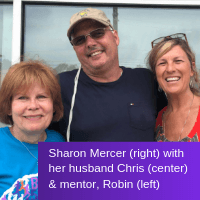 Travel was always a part of Sharon Mercer’s life ever since she was kid. She grew up as a military brat and lived in several bases in the U.S. and abroad, including bases in Kuwait, Egypt, India and Brazil. She even worked for American Express International Travel for awhile until her husband, Chris, was diagnosed with an anaplastic astrocytoma.
Travel was always a part of Sharon Mercer’s life ever since she was kid. She grew up as a military brat and lived in several bases in the U.S. and abroad, including bases in Kuwait, Egypt, India and Brazil. She even worked for American Express International Travel for awhile until her husband, Chris, was diagnosed with an anaplastic astrocytoma.
“It was all happening so fast. Our world shifted, and we were now learning how to navigate life with brain cancer,” recalls Sharon.
It was four years ago that Chris suffered two seizures that left him unable to speak. At first the couple thought they were transient ischemic attacks or ministrokes. Chris learned of his brain tumor after his third episode. He had several treatments, including brain surgery while he was awake. He also enrolled in a clinical trial for an experimental treatment, but was later removed from the study due to the progression of the tumor. Chris’ brain tumor and treatments have affected his personality, mood, short-term memory, eyesight and, especially, communication with his loved ones. Chris is currently taking three medications to manage the effects of his brain tumor.
“There are so many ups and downs on this journey for Chris, yet I try to stay flexible and adjust to his needs.”
For Sharon, she viewed Chris’ health as a priority. She felt it was necessary to put herself second as a caregiver.
“When Chris was first diagnosed with a brain tumor, I was really struggling emotionally, physically and mentally, and because I couldn’t lean on my husband for help, I knew I needed to find support.”
Sharon reached out to the American Brain Tumor Association to find that support, and was able to receive guidance on financial resource options, insurance and brain tumor treatments. She was connected to a nurse to help understand MRI reports and learned strategies to help her cope with caregiving for her husband. Now she asks for help from family and friends to assist Chris, like taking him to an appointment or driving him to places.
It has been four years since the initial diagnosis, and Sharon continues to work toward finding a healthy balance when caring for her husband and herself. When things are really overwhelming, she takes time to rest and refresh, such as staying at a nearby bed and breakfast. The time away not only helps Sharon, but she also comes back recharged and ready to care for her husband again.
The most important thing Sharon did for herself with the help of the ABTA was to partner with a mentor who also walked along a similar journey.
“This was the biggest blessing. My mentor, Robin, embraced me,” said Sharon. “She heard and got my story. She was there for me when the diagnosis of brain cancer was so devastating.”
The ability to connect with someone who understands the brain tumor experience, like a peer mentor, can be comforting and healing. It doesn’t take away the diagnosis and all the fears that come with it, but it lets people know that they are not alone, according to Vince Rock, MSW, ABTA program manager, who leads the ABTA CommYOUnity Connect mentorship program. The program has made over 600 mentor-mentee matches since May 2015.
“This connection between a peer mentor and mentee can be powerful. Several of our mentors have told us they never had a mentor of their own, and they want to offer that support to someone who is walking in the same shoes,” says Vince.
Robin is still Sharon’s mentor to this day, and they’ve had the opportunity to meet each other and their respective families on their travels.


















